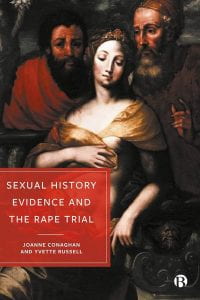by Professor Joanne Conaghan and Dr Yvette Russell, University of Bristol Law School.
The issue of sexual history evidence exposes a strange dissonance at the heart of rape law. On the one hand, the principle of sexual autonomy, which provides the normative grounding for rape law, recognises and purports to protect the right of any person to choose when, where, and with whom they have sexual relations. It thus entails a conception of consensual sex which is time, place, and person specific. On the other hand, the defendant’s right to a fair trial, a right which is both amorphous in substance and scope, and weighty in terms of normative significance, is believed to support the right of a rape defendant to bring to the court’s attention evidence that a complainant has engaged in consensual sex at other times, places, and even with people other than the defendant. How can this be? How can such two apparently incompatible positions co-exist within the same justice imaginary? Must one inevitably cede to the other or is it possible to envisage an ideal of criminal justice capacious enough to encompass both? (more…)


